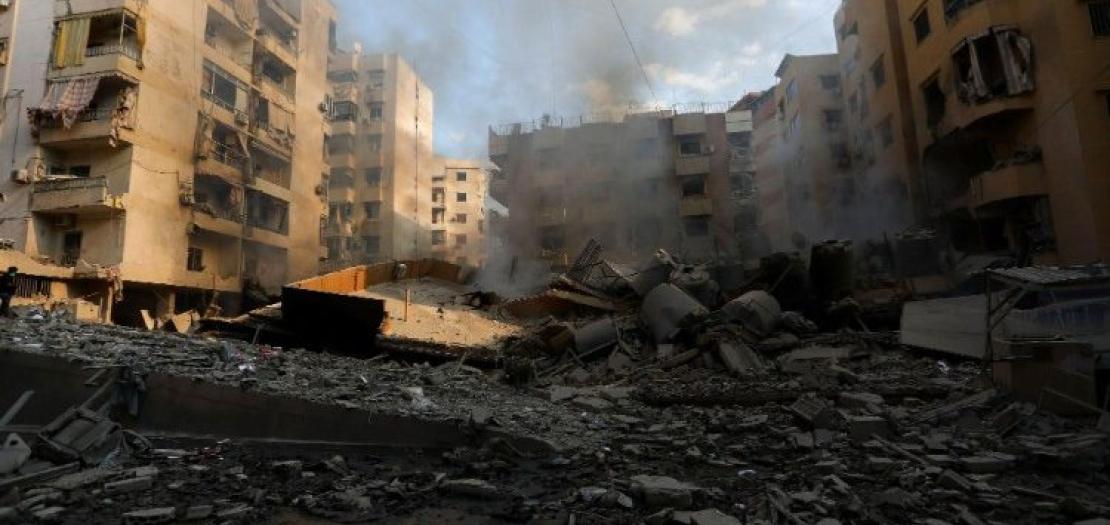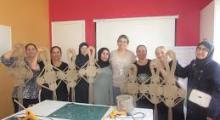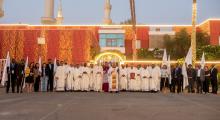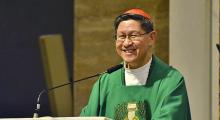Issued by the Catholic Center for Studies and Media - Jordan. Editor-in-chief Fr. Rif'at Bader - موقع أبونا abouna.org

Aftermath of military strikes on Beirut's southern suburbs
As hostilities between Hezbollah and Israel continue to escalate, the Lebanese Catholic Bishops have renewed their pressing appeal on the international community to establish an ”immediate ceasefire” and enforce UN Resolution 1701, reiterating that “the Israeli aggression violates Lebanon’s national sovereignty.”
Meeting this week in Bkerké for their monthly session presided by Patriarch Béchara Raï, the Maronite Bishops again expressed their "deep concern for the victims and the destruction caused by Israeli attacks in many areas of Lebanon."
Their words echoed those of Cardinal Raï who in his last Sunday sermon warned that the current mass displacement of people in the country threatens the country’s social cohesion.
Over 3'000 killed and more than one million displaced by the war in Lebanon
Since the war on Gaza began on October 7, 2023, over 3,000 people have been reportedly killed and nearly 14,000 wounded in Lebanon by Israeli attacks targeting the Iran-backed Hezbollah.
Victims have dramatically escalated since Israel began its full-scale ground invasion of Lebanon over five weeks ago to push back Hezbollah militants beyond the Litani River and secure northern Israel borders against their ongoing attacks.
Israeli strikes have destroyed residential areas across Lebanon and displaced over one million Lebanese, further crippling a country already on the verge of collapse.
Call for swift resolution of the conflict
In their statement the Maronite Bishops hailed the unity shown by several Lebanese religious leaders in denouncing “the Israeli aggression” and in calling “for a swift resolution to the conflict to protect the displaced."
They extended their gratitude to French President Emmanuel Macron, who in late October convened an international conference in Paris in support of Lebanon. The summit raised a total of $1 billion dollars in pledges to help the country.
While expressing hope for an increase in financial support to strengthen the Lebanese army, the bishops highlighted the Lebanese efforts to provide a dignified shelter to the displaced and to increase accommodation facilities in collaboration with local authorities.
Finding a dignified shelter for the displaced
In this regard the they also called on the Ministry of Education to establish a special committee representing both private and State schools to find an alternative accommodation for the many displaced families who have found shelter in schools so as to ensure they can all resume their education activities. The occupation of some Catholic schools by Shia displaced families has caused some tensions between the two communities.
Christian communities also hit by Israeli strikes
Among the most hit areas by Israeli strikes is eastern Lebanon, including the main city of Baalbek, in the Beqaa Valley, about 67 km northeast of Beirut with a mostly Shia population today. Churches and other places of worship, as well as Christian homes, have also been hit, as Hezbollah has placed its weapon depots near mixed Sunni and Christian villages. In these villages, both Christians and Muslims have lost their homes, explained Maronite Bishop Hanna Rahmé of Baalbek-Deir El-Ahmar to Sir Agency.
Weak response from the international community
Some 2,500 people have found shelter in schools, but most of the displaced, about 9,000, have been taken in by churches, convents, and by several Christian households, regardless of religious faith.” Many Muslims have been moved by this Christian solidarity” said Bishop Rahmé, who on the other hand, again lamented the weak response from the international community to reach a cease-fire for the benefit of the population.







